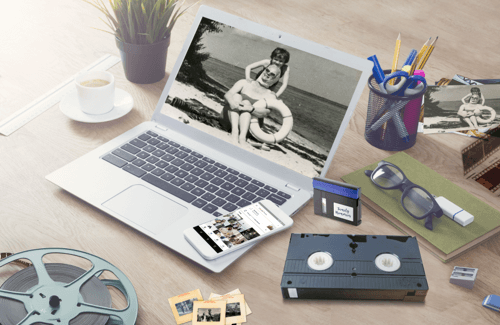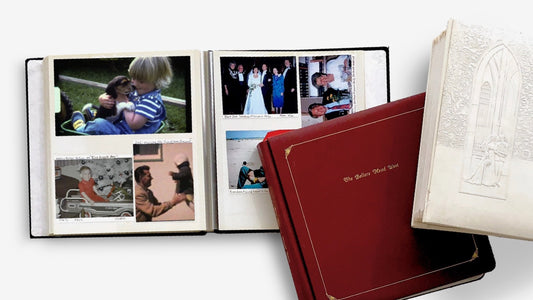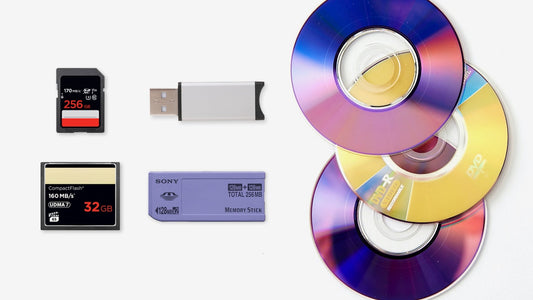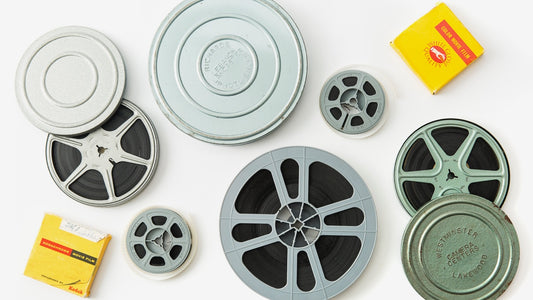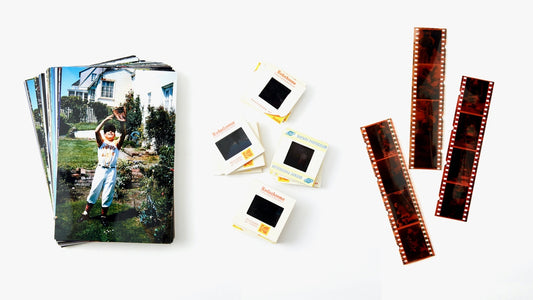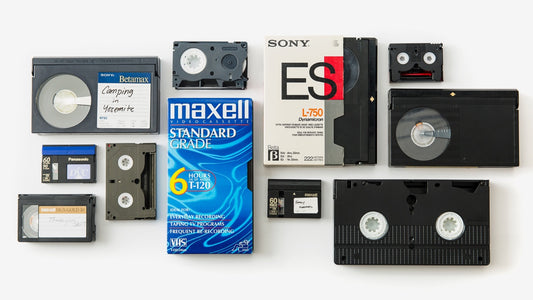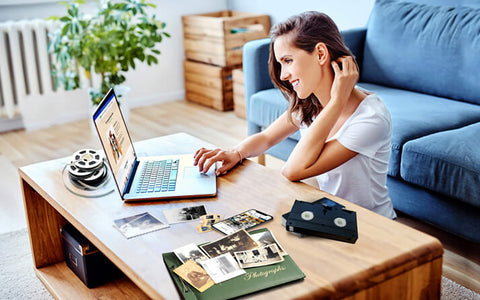We've all been there, staring at a box of old VHS tapes, wondering what treasures lie within. Those blurry memories of family vacations, childhood antics, and special occasions are trapped on outdated technology, vulnerable to the ravages of time. But what if you could unlock those memories, preserve them in a modern format, and easily share them with loved ones? VHS to digital conversion offers precisely that. It's more than just a format change; it's about safeguarding your family history and making those precious moments accessible in our digital age. Let's dive into the world of VHS conversion and discover how to give those old tapes a new lease on life.
Key Takeaways
- Protect your memories from time: Digitizing VHS tapes saves those precious moments from degrading and makes sharing with family a breeze. Consider professional services or DIY methods based on your tech skills and budget.
- Find the right conversion method for you: Explore options from professional services like YesVideo to DIY approaches using readily available equipment. Pick the one that aligns with your needs and resources.
- Keep your digital videos safe and accessible: Think ahead about storage. Cloud services and physical devices offer secure options for storing and sharing your converted videos.
What is VHS to Digital Conversion?
VHS to digital conversion is the process of transferring the video content from your old VHS tapes to a digital format like MP4. Think of it as rescuing your precious memories from an outdated format and giving them new life. This process lets you preserve those memories in a much more durable and easily accessible format, allowing you to watch your home movies on modern devices like computers, smartphones, and smart TVs. Plus, sharing those memories with family and friends becomes incredibly easy. Explore video transfer services to see how simple the process can be.
Converting VHS tapes to digital isn't just about changing formats; it's about safeguarding those irreplaceable moments. Those aging tapes are vulnerable to damage from wear and tear, as well as the gradual deterioration of the magnetic tape itself. VHS conversion offers a solution, transforming those fragile tapes into digital files that you can access and share easily for generations to come. You're not just converting videos; you're preserving a piece of your family history.
Why Digitize VHS Tapes?
Let's be honest, those VHS tapes stacked in your closet aren't getting any younger. Digitizing them isn't just about updating the format; it's about safeguarding your memories. Here's why making the switch from VHS to digital is so important:
Preserve Memories
Time, moisture, and even temperature fluctuations can damage VHS tapes. That fuzzy picture and distorted sound? It's only going to get worse. Converting your VHS tapes to digital creates a lasting archive of your precious moments, protecting them from deterioration and ensuring they remain vivid for years to come. Think of it as future-proofing your family history.
Improve Accessibility
Remember the last time you actually watched a VHS tape? Digitizing your tapes makes them instantly accessible. You can watch them on your computer, phone, tablet, or even stream them to your TV. Plus, sharing those memories with family and friends becomes as easy as sending a link or uploading to a shared cloud storage account. No more rewinding or searching for a working VCR! Learn more about the benefits of VHS conversion.
Save Space
Let's face it, VHS tapes are bulky. Boxes and boxes of them take up valuable storage space. Digitizing your collection frees up that space, giving you more room for, well, anything else! Plus, a digital library is much easier to organize and search through. Finding that special birthday party or graduation ceremony becomes a matter of clicks, not hours of rummaging. Consider digitizing to declutter your home.
Professional VHS to Digital Conversion Services
If you’re short on time or want a hassle-free experience, professional services are a great way to convert VHS tapes to digital files. Several companies specialize in this, offering various options and price points. Here’s a rundown of some popular choices:
YesVideo
YesVideo is a leading name in home movie and photo digitization. They handle a wide range of formats, including VHS tapes, film reels, and photos, ensuring your memories are preserved in high quality. All orders are processed by hand in the USA, adding a layer of care and precision. YesVideo offers various digital output options, making it easy to share your memories. They also offer services for video transfer, film transfer, photo transfer, album scanning, and digital media transfer.
CVS Photo
For a convenient option, check out CVS Photo’s home movie and photo transfer service. They convert VHS tapes to digital formats like DVDs and USB drives. This service is a good choice if you value ease of use and accessibility. Drop off your tapes at your local CVS and pick them up when they’re ready.
Walgreens
Walgreens also offers a similar service for digitizing home movies and photos. They convert your old VHS tapes to digital files, providing a simple way to update your media library. Like CVS, Walgreens is a convenient option if you have a store nearby.
Costco Photo Center
Costco members can take advantage of VHS to digital conversion through a partnership with YesVideo. This option combines the convenience of Costco with YesVideo's expertise in digitization. It’s a solid choice if you’re already a Costco shopper and want a reliable service.
Legacybox
Legacybox provides a comprehensive service with options for DVD, thumb drive, or cloud storage. They aim to make the process simple and efficient, handling everything from shipping to digitization. Legacybox is a good option if you want a complete, hands-off solution.
iMemories
iMemories offers a variety of digital output options, including DVD, Blu-ray, portable hard drives, flash drives, and cloud storage. This flexibility lets you choose the format that best suits your needs. iMemories is a good option if you want a range of delivery options for your digitized videos.
DIY VHS Digitization Methods
Want to digitize your VHS tapes yourself? It's totally doable, and there are a few different ways to go about it. Each method has its own pros and cons, so let's break them down to help you find the best fit for your needs and tech skills.
VHS-to-DVD Recorders
One of the simplest methods involves using a VHS-to-DVD recorder. These handy devices let you directly transfer your VHS tapes onto DVD-R discs. Think of it as a one-stop shop for getting your old home movies onto a more current format. Once they're on DVD, you can easily rip the content to digital files using software like HandBrake. This method is great for its simplicity, but keep in mind that the quality might not be as high as other options. Plus, you'll need to find a VHS-to-DVD recorder if you don't already have one. You can often find these recorders on online marketplaces like eBay or even at some local electronics stores.
Capture Devices
Another popular DIY method uses a capture device. You connect your VCR to the capture device (popular brands include ClearClick and Elgato) using RCA cables. The capture device then records the video directly onto a USB drive or SD card, usually in MP4 format. This is a pretty straightforward process and a good choice if you want digital files right from the start. The quality is generally better than the VHS-to-DVD method, and you can purchase capture devices online.
Software Options
For those comfortable connecting their VHS player directly to their computer, there are software options available. You'll need a special converter to connect your VCR to your computer, and the software captures the analog video and converts it to digital files. This method offers more control over the conversion process, but it can be a bit more complex. If you run into any software glitches, check out this guide for troubleshooting common issues. Sometimes simply trying a different software program can solve the problem.
Choose the Right Conversion Method
So, you’ve decided to convert those VHS tapes to digital. Great! Now, how do you choose the right method? This decision boils down to balancing several factors, including the quality you want, your budget, your technical skills, and how precious those memories are.
Factors to Consider
Think about what’s most important for your video transfer. Do you want the absolute best quality, even if it costs a bit more? Are you comfortable setting up equipment and troubleshooting tech issues? How much time do you have for this project? Answering these questions will help guide you. Professional services typically deliver higher quality, while DIY methods offer more control and potential cost savings.
When to Choose Professional Services
Professional services like YesVideo specialize in video conversion. They use professional equipment and have the expertise to handle various formats, from VHS tapes to 8mm film. This route makes sense when you have irreplaceable videos, like a wedding or a once-in-a-lifetime event. It’s also a good choice if you’re short on time or prefer a hassle-free experience. You ship your tapes, they handle the conversion, and you get your digital files back. Simple as that.
When DIY Makes Sense
If you’re tech-savvy and enjoy hands-on projects, converting VHS tapes yourself can be a rewarding experience. You’ll have complete control over the process and can potentially save money. This method is a good fit if you have a lot of tapes and a reasonable budget for equipment. There are several DIY options, from using a VHS-to-DVD recorder to combining a VCR with a digital capture device. Just be prepared to invest some time in learning the process and troubleshooting any technical issues.
Compare Costs: Professional vs. DIY
Digitizing your VHS collection comes down to a fundamental choice: hire a professional service or take the DIY route. Both have their own cost considerations, and understanding these will help you make the best decision for your needs and budget.
Typical Professional Service Pricing
Professional services offer convenience and expertise, but come with varying price tags. Expect to pay anywhere from $7.50 to $34.99 per tape for VHS to digital conversion. This range often reflects the specific services offered and any additional features. For example, CVS Photo lists prices starting at $25.99 for VHS to DVD conversion and $34.99 for VHS to USB. Remember to factor in the number of tapes you need converted; the final cost can add up quickly with a large collection. YesVideo offers professional digitization services with various options to suit different needs and budgets.
DIY Equipment Costs
If you're comfortable with a bit of tech setup, the DIY approach can be more budget-friendly, especially if you already own some equipment. A common method involves using a VCR and a video capture device, which offers a good balance of cost and quality. You'll need to purchase the capture device if you don't already have one, and prices for these vary. Another option is using a VHS-to-DVD recorder. This lets you record directly to DVD-R discs, which you can then rip to digital files using free software like HandBrake. This method, discussed in this Reddit thread, requires multiple steps but can be a cost-effective solution.
Current Promotions and Discounts
Before committing to a professional service, check for current promotions or discounts. Many companies offer special deals that can make professional conversion more affordable. These deals can include bundled services, discounts for bulk orders, or even free storage devices with your order. Always check the service provider's website for the latest pricing and offers. For instance, some services might offer seasonal promotions or discounts on bulk orders, making it worthwhile to explore your options. Check out YesVideo's website for their current offers on VHS digitization.
Digitize VHS Tapes: A Step-by-Step Guide
Want to digitize your VHS tapes yourself? It's more involved than sending your tapes to a professional service like YesVideo, but it can be a rewarding project. Here’s a step-by-step guide to get you started.
Equipment Needed
First, gather your equipment. You'll need a working VCR to play your tapes and a video capture device to connect your VCR to your computer. The Elgato Video Capture device is a popular and user-friendly option. You'll also need the right cables (typically RCA cables) to connect your VCR to the capture device. Finally, ensure your computer has enough storage space for the digitized video files, which can be quite large.
Set Up Your Conversion Station
Create a dedicated workspace where you can comfortably manage the process. Make sure all your RCA cable connections are secure; loose connections can interrupt the recording. Before you start, clean the VHS tape heads on your VCR to ensure the best possible video quality.
Record and Edit
Now for the main event: recording your VHS tapes. Connect your VHS player to your computer using the video capture device. The converter will capture the analog video from the VCR and convert it into digital files on your computer. Once the recording is complete, consider using video editing software like iMovie or Movavi to trim, enhance, and polish your footage. This is a great opportunity to add titles, transitions, or music.
Ensure High-Quality Conversions
Getting the best possible quality when you convert VHS tapes to digital takes a little prep work. Whether you’re using a professional service like YesVideo or tackling the project yourself, these tips will help.
Prepare Your VHS Tapes
Before shipping off your precious memories or starting the DIY process, take a few minutes to prepare your tapes. First, rewind them fully. This simple step prevents the tape from snapping or getting tangled during the transfer and ensures the conversion starts at the beginning of your recording. Next, inspect the cassette for any signs of mold or damage. If you find any, it's best to address these issues before converting.
Adjust Tracking Settings
If you're converting VHS tapes yourself, pay close attention to your VCR's tracking settings. The tracking control aligns the VCR's read head with the tracks on the tape. Incorrect tracking can lead to a distorted or fuzzy picture. Adjusting the tracking until the picture is clear will significantly improve the final digital video. Most VCRs have a tracking button or dial on the front panel, and some even offer automatic tracking adjustment.
Use High-Quality Capture Devices
Using reliable equipment is key for high-quality digital conversions. Invest in a good video capture device and pair it with quality software. Many options are available, from basic USB capture devices to more advanced models. Software like Movavi or iMovie can help you edit and finalize your videos after they're digitized. Choosing the right hardware and software combination makes a noticeable difference in the clarity and overall quality of your converted videos.
Store and Share Your Digital Videos
After converting your VHS tapes to digital, you'll need a safe and accessible place to store them. Let's explore some options, from cloud storage to physical devices.
Cloud Storage Options
Cloud storage offers a convenient way to keep your digital videos safe and accessible from anywhere. Services like YesVideo specialize in transferring various formats like VHS tapes, Super 8 film, and printed photos to digital, and offer cloud storage solutions (like MemoryCloud) for your digitized memories. This not only protects your videos from physical damage or loss but also makes sharing them with family and friends incredibly easy. You can grant access to loved ones, no matter where they are, and everyone can enjoy those precious moments together. Some services, like iMemories, offer various digital copy options, including cloud storage, alongside physical options like DVDs and flash drives.
Physical Storage Devices
If you prefer having a physical copy of your digitized videos, external hard drives and USB flash drives are reliable options. These devices offer a tangible backup and allow you to easily transport and share your videos. When choosing a physical storage device, consider the size of your video files. A high-capacity external hard drive might be best for storing a large collection, while a USB flash drive could be suitable for sharing a few select videos. Remember, physical storage devices can be lost or damaged, so it's always a good idea to have a backup, whether it's another physical device or a copy stored in the cloud. YesVideo's blog has resources on the best VHS to digital converters, which can help you understand the process and equipment involved in creating these digital files. Professional services can also help ensure your digital copies are top-notch, using high-quality equipment and expertise.
Common Challenges and Solutions
Converting your old VHS tapes to digital files comes with a few common roadblocks. Don't worry, though—most are easily solved with a little know-how. Let's break down some of these challenges and how to overcome them.
Handle Damaged Tapes
Sometimes, due to age or storage conditions, VHS tapes can become damaged. This damage might show up as fuzzy images, lines across the screen, or even the tape getting stuck in your VCR. If your tape is broken or severely damaged, a professional service like YesVideo is your best bet. Their expertise in handling delicate media can often salvage footage that would otherwise be lost. For minor issues like tracking problems, try adjusting the tracking settings on your VCR. A simple tweak can often significantly improve the playback and the quality of your digital conversion.
Improve Video Quality
Even with a perfectly functioning tape, the video quality of VHS recordings isn't inherently high definition. However, there are ways to maximize the quality of your digital conversion. Ensure your connections are secure and use high-quality capture devices. If you notice sync issues after the conversion, video editing software can help align the audio and video. Adjusting the tracking on your VCR before you begin recording is key for a clear picture.
Manage Large Files
Digital video files, especially those converted from VHS, can take up a lot of storage space. Before you start converting your entire VHS collection, think about how you'll manage these large files. External hard drives offer a portable and affordable option for storing large amounts of data. Alternatively, cloud storage services provide a secure and accessible way to store your digital memories. Planning your storage strategy in advance will save you from headaches down the road.
Related Articles
- Best VHS Video to Digital Converters: Top Picks – YesVideo
- Convert VHS to Digital: The Ultimate 2024 Guide – YesVideo
- Change VHS to Digital: The Ultimate 2024 Guide – YesVideo
- VHS to DVD: Top Transfer Services & DIY Guide – YesVideo
- VHS Converter Guide: Digitize Your Tapes with Ease – YesVideo
Frequently Asked Questions
Why should I convert my VHS tapes to digital? VHS tapes degrade over time, losing picture and sound quality. Video transferring your tapes to a digital format preserves your memories in a more stable, long-lasting format, easily viewable and shareable on modern devices. Plus, it frees up physical storage space.
What are my options for VHS to digital conversion? You can choose professional services like YesVideo, which handle the entire process for you, or opt for a DIY approach using a VHS-to-DVD recorder, a video capture device, or specialized software.
How much does professional VHS to digital conversion cost? Professional conversion services typically charge per tape, with prices ranging from $7.50 to $34.99 depending on the provider and any additional services. Check for current promotions or discounts before deciding.
What equipment do I need for DIY VHS conversion? You'll need a working VCR, a video capture device (like the Elgato Video Capture), the appropriate cables (usually RCA cables), and a computer with sufficient storage space.
Where can I store my digitized videos? You can store your digital videos on physical storage devices like external hard drives or USB flash drives, or opt for cloud storage services, which offer convenient access and sharing capabilities. Many professional conversion services also offer cloud storage options.





